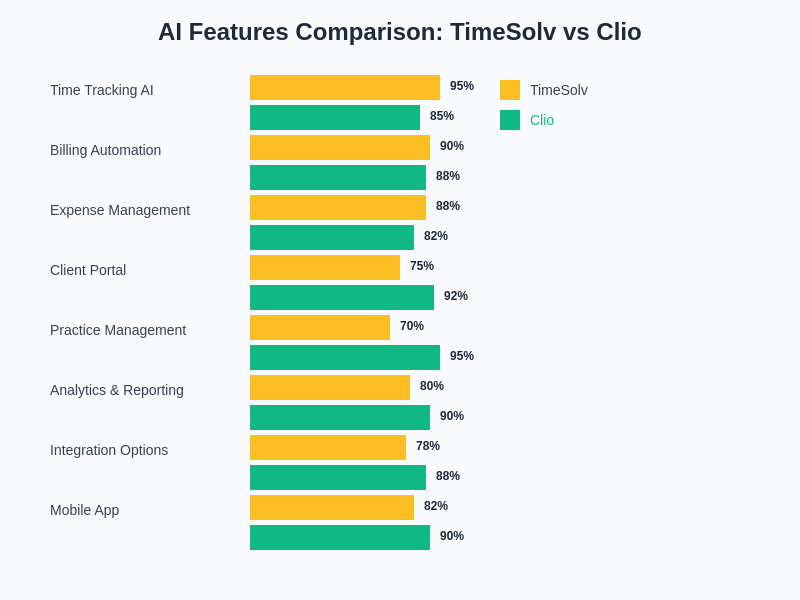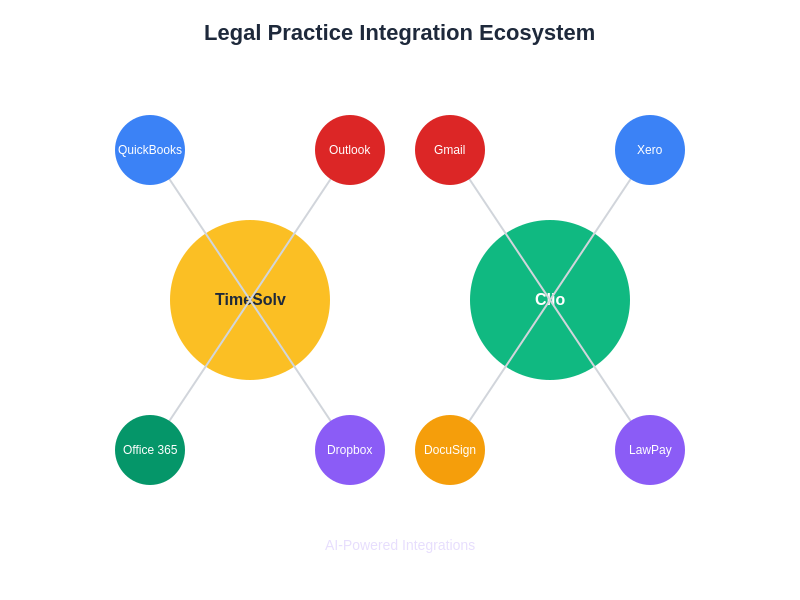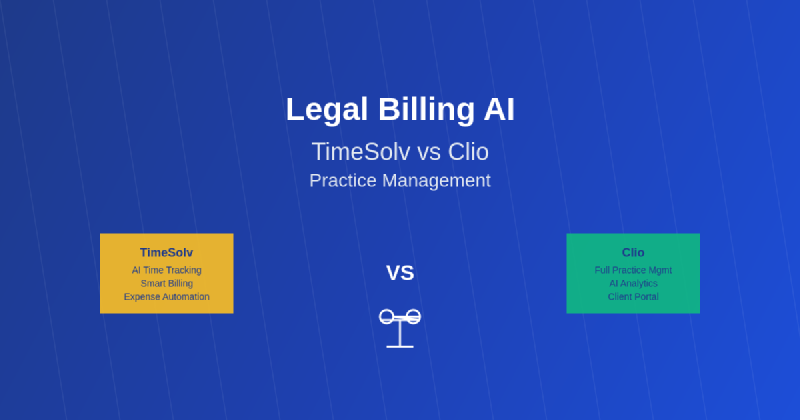The legal industry stands at the precipice of a technological revolution, where artificial intelligence is fundamentally transforming how law firms manage their billing processes, client relationships, and operational efficiency. Among the leading platforms driving this transformation are TimeSolv and Clio Practice Management, two sophisticated solutions that have embraced AI-powered capabilities to address the complex challenges facing modern legal practices. These platforms represent the evolution from traditional time-tracking and billing systems to intelligent, automated solutions that understand the nuances of legal work and adapt to the unique requirements of different practice areas.
The integration of artificial intelligence into legal billing systems has moved beyond simple automation to encompass predictive analytics, intelligent time capture, automated expense categorization, and sophisticated reporting mechanisms that provide unprecedented insights into firm profitability and client relationships. Explore the latest AI developments in legal technology to understand how these innovations are reshaping the practice of law and creating new opportunities for operational excellence.
The Evolution of Legal Billing Technology
Traditional legal billing systems were primarily focused on recording billable hours and generating invoices, often requiring extensive manual input and oversight from legal professionals and administrative staff. The introduction of AI-powered solutions has fundamentally transformed this paradigm by introducing intelligent automation that learns from patterns in legal work, understands context and precedent, and automatically captures billable activities without requiring constant user intervention. This evolution has been particularly significant for law firms dealing with high-volume practices where manual time tracking and billing oversight could consume substantial resources that would be better allocated to client service and legal research.
TimeSolv and Clio have emerged as leaders in this transformation by developing sophisticated AI algorithms that can recognize different types of legal activities, automatically categorize expenses, predict project timelines, and generate detailed analytics that help law firms optimize their billing practices and improve client satisfaction. The intelligent features embedded in these platforms extend beyond simple automation to include predictive modeling, client behavior analysis, and sophisticated reporting capabilities that provide strategic insights into firm operations and market positioning.
TimeSolv: AI-Powered Time Tracking and Billing Excellence
TimeSolv has distinguished itself as a comprehensive legal billing solution that leverages artificial intelligence to streamline time tracking, expense management, and client billing processes. The platform’s AI-driven approach focuses on intelligent time capture that automatically detects and records billable activities based on user behavior patterns, application usage, and document interactions. This sophisticated tracking mechanism reduces the burden on legal professionals who traditionally had to manually log every billable minute, often leading to under-billing and lost revenue due to forgotten or inadequately recorded time entries.
The TimeSolv platform employs machine learning algorithms that continuously improve their accuracy in identifying billable activities by learning from user corrections and feedback. This adaptive approach ensures that the system becomes increasingly precise in capturing time spent on client matters, reviewing documents, conducting research, and engaging in other billable activities. The AI component also extends to expense categorization, where the system can automatically classify expenses based on transaction details, vendor information, and historical patterns, significantly reducing the administrative overhead associated with expense tracking and reimbursement processes.
Enhance your legal practice with advanced AI tools like Claude that provide sophisticated analysis and document review capabilities to complement your billing and practice management systems. The integration of multiple AI platforms creates a comprehensive ecosystem that supports every aspect of legal practice from initial client consultation through final billing and payment processing.
Clio Practice Management: Comprehensive AI-Driven Legal Solutions
Clio Practice Management has established itself as a holistic legal technology platform that integrates AI-powered billing capabilities with comprehensive practice management features including client relationship management, document automation, calendar synchronization, and advanced analytics. The platform’s approach to artificial intelligence encompasses not only billing automation but also predictive analytics that help law firms understand client behavior patterns, optimize fee structures, and identify opportunities for practice growth and efficiency improvements.
The Clio platform’s AI capabilities extend to intelligent matter management where the system can automatically organize case files, track deadlines, generate status updates, and provide predictive insights into case outcomes based on historical data and similar matter patterns. This comprehensive approach to AI integration makes Clio particularly attractive to law firms seeking a unified solution that addresses multiple operational challenges while maintaining the sophisticated billing capabilities required for effective revenue management and client service delivery.
The platform’s machine learning algorithms analyze vast amounts of legal data to provide insights into optimal billing strategies, client retention patterns, and practice area profitability. These analytics capabilities enable law firms to make data-driven decisions about resource allocation, pricing strategies, and business development initiatives that can significantly impact firm profitability and competitive positioning in the legal marketplace.
Intelligent Time Capture and Automation Capabilities
Both TimeSolv and Clio have developed sophisticated time capture mechanisms that represent significant advances over traditional manual time tracking systems. TimeSolv’s approach focuses on background monitoring of user activities across various applications and platforms, using AI algorithms to identify patterns that correspond to billable work and automatically generating time entries that users can review and approve. This proactive approach to time capture helps ensure that no billable activities are overlooked while minimizing interruptions to attorney workflows.
Clio’s time capture system integrates seamlessly with its broader practice management platform, allowing the AI to understand context from case files, client communications, and document interactions to provide more accurate time categorization and billing descriptions. The system can automatically generate detailed descriptions of work performed based on the applications used, documents accessed, and communications sent, creating comprehensive time entries that meet the detailed reporting requirements often demanded by clients and regulatory bodies.

The automation capabilities extend beyond simple time tracking to include intelligent expense management, where both platforms can automatically categorize business expenses, identify reimbursable costs, and generate detailed expense reports that comply with client requirements and accounting standards. This comprehensive automation reduces the administrative burden on legal professionals while improving the accuracy and completeness of billing records.
Advanced Analytics and Reporting Mechanisms
The analytical capabilities provided by TimeSolv and Clio represent one of the most significant advantages of AI-powered legal billing systems. TimeSolv offers sophisticated reporting tools that can analyze billing patterns, identify trends in client behavior, and provide insights into practice area profitability that help law firms optimize their operations and pricing strategies. The platform’s AI algorithms can identify patterns in time entries, expense categories, and client preferences that might not be apparent through manual analysis, providing strategic insights that support business development and operational improvement initiatives.
Clio’s analytics platform provides even more comprehensive insights by integrating billing data with broader practice management information to create detailed profiles of client relationships, matter profitability, and attorney productivity. The system can generate predictive models that help law firms anticipate client needs, optimize staffing allocations, and identify opportunities for practice expansion or specialization. These advanced analytics capabilities transform billing data from simple record-keeping into strategic business intelligence that supports informed decision-making and competitive positioning.
Leverage Perplexity’s research capabilities to stay informed about emerging trends in legal technology and billing practices that could impact your firm’s competitive advantage and operational efficiency. The ability to quickly research and analyze market developments is crucial for law firms seeking to maintain their technological edge and client service excellence.
Client Portal and Communication Integration
Both platforms have recognized that modern legal billing extends beyond simple invoice generation to encompass comprehensive client communication and relationship management. TimeSolv’s client portal provides real-time access to billing information, matter status updates, and document sharing capabilities that enhance client transparency and satisfaction. The AI-powered system can automatically generate client communications, status updates, and billing summaries that keep clients informed about matter progress and associated costs without requiring extensive administrative oversight.
Clio’s integrated approach to client communication includes automated billing notifications, payment reminders, and detailed matter reports that help maintain strong client relationships while ensuring timely payment processing. The platform’s AI capabilities extend to client behavior analysis, where the system can identify patterns in client communication preferences, payment behaviors, and service utilization that help law firms tailor their client service approaches and optimize client retention strategies.
The integration of billing systems with client communication platforms creates opportunities for enhanced transparency and improved client satisfaction while reducing the administrative burden associated with client relationship management. These integrated approaches represent a significant evolution from traditional billing systems that operated in isolation from other firm operations and client service functions.
Security and Compliance Considerations
Legal billing systems must meet stringent security and compliance requirements due to the sensitive nature of client information and attorney-client privilege considerations. Both TimeSolv and Clio have implemented comprehensive security frameworks that include encryption, access controls, audit trails, and compliance monitoring capabilities that meet or exceed industry standards for legal technology platforms. The AI components of these systems are designed with privacy protection in mind, ensuring that machine learning algorithms do not compromise client confidentiality or attorney-client privilege.
TimeSolv’s security architecture includes multi-factor authentication, role-based access controls, and comprehensive audit logging that provides detailed records of all system activities and data access. The platform’s AI algorithms are designed to operate within strict privacy boundaries, ensuring that sensitive client information is protected while still providing the analytical insights necessary for effective billing and practice management.
Clio’s approach to security and compliance includes SOC 2 Type II certification, advanced encryption protocols, and comprehensive data protection measures that address the complex regulatory requirements facing legal practices. The platform’s AI capabilities are implemented with privacy-by-design principles that ensure client confidentiality is maintained while still providing the sophisticated analytics and automation features that modern law firms require.
Integration Capabilities and Ecosystem Compatibility
Modern legal practices rely on multiple software platforms and services, making integration capabilities a critical consideration when selecting AI-powered billing solutions. TimeSolv offers extensive integration options with popular legal software platforms, accounting systems, and productivity tools that allow law firms to maintain their existing workflows while benefiting from advanced AI-powered billing capabilities. The platform’s API architecture enables custom integrations that can address specific firm requirements and support unique operational processes.
Clio’s comprehensive platform approach includes native integrations with hundreds of legal and business applications, creating a unified ecosystem that eliminates data silos and ensures consistent information flow across all firm operations. The platform’s AI capabilities benefit from this integrated approach by having access to comprehensive data sets that enable more accurate predictions, better automation decisions, and more sophisticated analytical insights.

The ability to integrate AI-powered billing systems with existing firm infrastructure is crucial for successful implementation and user adoption. Both platforms have invested significantly in developing robust integration capabilities that support diverse technology environments and operational requirements.
Cost Analysis and Return on Investment
The financial impact of implementing AI-powered legal billing systems extends beyond the direct costs of software licensing to encompass improvements in billing accuracy, reduced administrative overhead, enhanced client satisfaction, and increased revenue capture through better time tracking and expense management. TimeSolv’s pricing model is designed to provide value across different firm sizes and practice types, with scalable options that allow firms to access advanced AI capabilities without excessive upfront investment.
Clio’s comprehensive platform approach may require higher initial investment but provides extensive functionality that can replace multiple separate systems while delivering integrated AI capabilities across all aspects of practice management. The platform’s analytics capabilities help firms quantify the return on investment by providing detailed insights into improved billing accuracy, reduced administrative time, and enhanced client retention rates.
The return on investment for AI-powered billing systems typically manifests through multiple channels including improved time capture rates, reduced billing disputes, faster payment processing, and enhanced operational efficiency that allows legal professionals to focus more time on billable client work rather than administrative tasks.
Implementation Strategies and Best Practices
Successful implementation of AI-powered legal billing systems requires careful planning, comprehensive training, and ongoing optimization to ensure that firms realize the full benefits of these sophisticated platforms. TimeSolv provides extensive implementation support including data migration assistance, user training programs, and ongoing technical support that helps firms transition smoothly from legacy billing systems to AI-powered solutions.
Clio’s implementation approach emphasizes comprehensive onboarding that addresses not only technical setup but also workflow optimization and user adoption strategies that ensure successful long-term utilization of the platform’s AI capabilities. The company provides extensive training resources, best practice guidance, and ongoing support that helps firms continuously optimize their use of the platform’s advanced features.
The implementation process should include careful evaluation of existing workflows, identification of optimization opportunities, and development of training programs that help users understand and effectively utilize AI-powered features. Successful implementations typically involve phased rollouts that allow firms to gradually adapt to new capabilities while maintaining operational continuity.
Future Developments and Industry Trends
The evolution of AI-powered legal billing systems continues to accelerate, with both TimeSolv and Clio investing heavily in research and development to expand their AI capabilities and address emerging needs in the legal technology marketplace. Future developments are likely to include more sophisticated predictive analytics, enhanced natural language processing for document analysis and billing description generation, and advanced integration capabilities that support emerging legal technology platforms and services.
The broader trend toward AI integration in legal practice suggests that billing systems will become increasingly sophisticated in their ability to understand legal work patterns, predict client needs, and provide strategic insights that support business development and competitive positioning. These developments will likely include enhanced machine learning algorithms that can adapt more quickly to changing practice requirements and provide more personalized recommendations for optimization and improvement.
The continued advancement of AI technology in legal billing systems represents an ongoing transformation that will reshape how law firms operate, serve clients, and compete in an increasingly technology-driven legal marketplace. Firms that embrace these technologies early and implement them effectively are likely to gain significant competitive advantages in terms of operational efficiency, client satisfaction, and profitability.
Conclusion: Choosing the Right AI-Powered Legal Billing Solution
The selection between TimeSolv and Clio Practice Management ultimately depends on specific firm requirements, existing technology infrastructure, budget considerations, and strategic objectives for practice growth and optimization. TimeSolv offers specialized expertise in AI-powered billing with sophisticated time capture and expense management capabilities that are particularly well-suited for firms seeking focused billing solutions with advanced automation features.
Clio Practice Management provides a comprehensive platform approach that integrates AI-powered billing with extensive practice management capabilities, making it ideal for firms seeking unified solutions that address multiple operational challenges while providing sophisticated analytical insights and client relationship management features.
Both platforms represent significant advances over traditional billing systems and offer compelling value propositions for law firms seeking to leverage artificial intelligence to improve their operational efficiency, client service delivery, and competitive positioning. The decision should be based on careful evaluation of specific firm needs, implementation requirements, and long-term strategic objectives for practice development and technology utilization.
The investment in AI-powered legal billing systems represents not just an operational upgrade but a strategic positioning decision that can significantly impact firm competitiveness, client satisfaction, and long-term sustainability in an increasingly technology-driven legal marketplace.
Disclaimer
This article is for informational purposes only and does not constitute professional legal or business advice. The information presented is based on publicly available resources and general industry knowledge. Law firms should conduct thorough due diligence, including consulting with technology specialists and conducting pilot implementations, before making final decisions about legal billing software. The effectiveness and suitability of any particular platform may vary depending on specific firm requirements, practice areas, and operational contexts. Readers should verify current features, pricing, and capabilities directly with software providers before making purchasing decisions.
